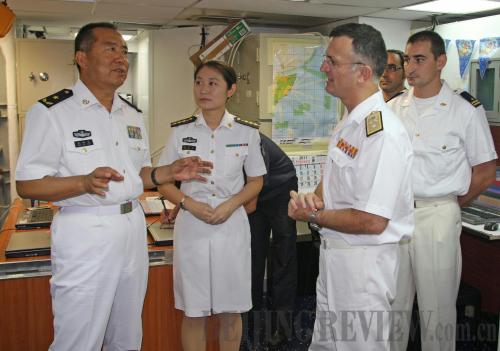|
 |
|
SHARING EXPERIENCE: Zhang Huachen (left), commander of the seventh Chinese escort fleet, discusses anti-piracy strategies with EU officials aboard the Spanish frigate Canary Islands, flagship of the EU's No.465 naval escort task force, in the Gulf of Aden on February 15 (FAN JUNWEI) |
Hijacking, detaining hostages and ransom are the core of Somali pirates' "business model." Up until recently, it has largely been unchallenged, as most countries have paid ransom to secure the release of hostages.
In fact, paying up is the only choice many countries feel they have. But some countries, such as South Korea and Malaysia, have rejected this passive approach by launching military actions against Somali pirates.
Different strategies
On January 15, an 11,500-ton South Korean chemical freighter was hijacked by Somali pirates in north Indian Ocean waters as it sailed from the United Arab Emirates to Sri Lanka, with crew members from South Korea, Myanmar and Indonesia.
South Korean Navy commandos subsequently raided the ship on January 21, killing eight pirates in cabin-to-cabin gunfights. They captured five other pirates and rescued all 21 hostages. The South Korean military got help from a nearby U.S. Navy aircraft carrier, which also provided information about the pirates and a helicopter to transport the wounded captain of the South Korean ship.
"We will not tolerate any activities that threaten the safety and lives of our people," said South Korean President Lee Myung Bak, discussing the operation.
On January 22, the Malaysian Government said its commandos had foiled a hijacking in the Gulf of Aden, capturing seven Somali pirates.
Encouraged by these two countries, the African Union proposed to establish a multinational force to combat piracy in the region. Recent reports have showed many other countries are planning to make a military response to piracy.
In contrast, the EU is taking a conservative approach. The EU Navy said its priority is to ensure hostage safety, and rejects tough military measures.
"The pirates are using the hostages as human shields, and if we get too close to the pirates, they will threaten to kill the hostages," the Associated Press quoted EU Naval Force Somalia spokesman Paddy O'Kennedy as saying. "I am sure they will carry out the threats if we got too close."
Somali pirates will ultimately not be brutal with hostages because they know they will eventually get money, O'Kennedy said. He also noted it was inappropriate to launch military attacks that might threaten the safety of other countries' hostages.
Political factors
The South Korean Navy may have been emboldened to take military action due to U.S. intelligence support for the rescue, said He Wenping, a research fellow with the Institute of West Asian and African Studies at the Chinese Academy of Social Sciences (CASS). She said this was the first opportunity for South Korea's escort fleet to undertake military action. By seizing this opportunity, the South Korean military burnished its image at home and gave its government a boost.
She said military action against pirates generally was closely related to domestic politics. Both France and the United States launched military strikes against pirates when their governments' approval ratings were low.
| 